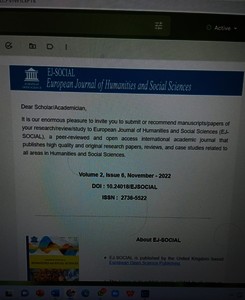Qureshi, Mohammad umer and Ali, Asem Shehadeh Saleh (2022) The authority of the religious text in the intentionality of the speaker to the recipient. European Journal of Humanities and Social Sciences, 2 (6). p. 1. ISSN 2736-5522
|
PDF
Download (83kB) | Preview |
|
|
PDF
Download (336kB) | Preview |
|
![[img]](http://irep.iium.edu.my/101906/3.hassmallThumbnailVersion/WhatsApp%20Image%202022-12-14%20at%2003.31.14.jpeg)
|
Image (JPEG)
Download (144kB) | Preview |
Abstract
Pragmatics studies pay great attention to the intent of the text, study the dimensions of the communicative process, and discuss how to perceive the criteria and principles that guide the sender when producing his speech, in order to ensure his success in presenting data, and help the recipient to know the intent, as pragmatics is a branch of linguistics that looks at how to discover The listener is the intentionality of the speaker, or it is the study of the meaning of the speaker; Therefore, pragmatics studies are concerned with the speaker, his intent and intentions, the recipient and the extent of his acceptance and interaction with the text or message, and thus contribute to revealing the linguistic structure and monitoring its transformations according to communicative and deliberative standards. In order to interpret the elements contained in a speech; It is necessary to know who is the speaker, who is the listener, and the time and place of the production of the discourse in order to form a picture of the state and the station; The personality of the speaker, his beliefs and purposes, his cultural composition and his intellectual references, the common knowledge between the interlocutors and external facts such as spatial and temporal conditions, relationships and social norms, all of this is considered as one of the pillars that help in understanding the discourse and clarifying its intent. This study aimed to find out the nature of the relationship between language and linguistic contexts through pragmatics, and to reach an understanding of the pragmatic discourse through the theory of reception and the concept of intentionality, by knowing the types of pragmatic intent and their impact on understanding the intentional connotation of the text, as well as the external deliberative textual standards that appear In the literary text in general, and the religious text in particular, then a statement of the concept of the speaker's intentionality to the recipient in the religious text, with an explanation of what is meant by the authority of the religious text in the intentionality of the speaker to the recipient.
| Item Type: | Article (Journal) |
|---|---|
| Uncontrolled Keywords: | Authority, religious text, intentionality, speaker, recipient. |
| Subjects: | P Language and Literature > P Philology. Linguistics |
| Kulliyyahs/Centres/Divisions/Institutes (Can select more than one option. Press CONTROL button): | Kulliyyah of Islamic Revealed Knowledge and Human Sciences Kulliyyah of Islamic Revealed Knowledge and Human Sciences > Department of Arabic Language and Literature |
| Depositing User: | Asem Shehadeh Ali |
| Date Deposited: | 16 Dec 2022 09:29 |
| Last Modified: | 16 Dec 2022 09:30 |
| URI: | http://irep.iium.edu.my/id/eprint/101906 |
Actions (login required)
 |
View Item |


 Download Statistics
Download Statistics Download Statistics
Download Statistics